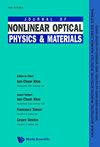不同烧结温度合成的多铁铋铁氧体纳米颗粒非线性吸收系数随尺寸变化的分析
IF 2.3
4区 物理与天体物理
Q2 OPTICS
Journal of Nonlinear Optical Physics & Materials
Pub Date : 2022-02-04
DOI:10.1142/s0218863522500126
引用次数: 4
摘要
采用z扫描技术研究了不同烧结温度下多铁铋铁氧体纳米粒子的三阶非线性光学性质。采用溶胶-凝胶法制备了BiFeO3 (BFO)纳米颗粒(NPs),烧结温度分别为823[公式:见文]K、923[公式:见文]K和1023[公式:见文]K。XRD分析表明,所有样品均为单相菱形体结构,具有R3c空间基团,无二次相存在。在823[公式:见文]K, 923[公式:见文]K和1023[公式:见文]K的计算结晶尺寸分别为75[公式:见文]nm, 87[公式:见文]nm和94[公式:见文]nm。采用Rietveld细化(FullProf)方法获得了BFO样品的晶体结构参数和物相分析结果。FTIR光谱显示在448[公式:见文]cm[公式:见文]和533[公式:见文]cm[公式:见文]处的吸光度峰证实了NPs的合成。扫描电镜图像显示球状颗粒凝聚。随着烧结温度的升高,样品的平均晶粒和颗粒尺寸增大。EDX对组成元素进行了验证,发现样品制备中的化学计量与实验量的原子比匹配良好。采用波长为532 nm的连续波(CW)激光器,用z -扫描方法表征了非线性吸收系数。通过开孔z -扫描数据评估的非线性吸收系数([公式:见文本])发现,随着BFO NPs粒径的增加,非线性吸收系数减小。通过优化合成温度合成的BFO纳米颗粒可用于未来多铁性和光学器件的各种应用。本文章由计算机程序翻译,如有差异,请以英文原文为准。
Analysis of size-dependent variation in nonlinear absorption coefficient of multiferroic bismuth ferrite nanoparticles synthesized at different sintering temperature
Third-order nonlinear optical property of multiferroic bismuth ferrite (BiFeO3) nanoparticles sintered at different temperatures has been studied by employing Z-Scan technique. BiFeO3 (BFO) nanoparticles (NPs) were synthesized by the sol–gel process with different sintering temperature of 823[Formula: see text]K, 923[Formula: see text]K and 1023[Formula: see text]K. XRD reveals that all samples have single-phase rhombohedral structure with R3c space group with no secondary phases present. The calculated crystallite size for samples sintered at 823[Formula: see text]K, 923[Formula: see text]K and 1023[Formula: see text]K is found to be 75[Formula: see text]nm, 87[Formula: see text]nm and 94[Formula: see text]nm, respectively. Crystal structure parameters and phase analysis of the BFO samples are obtained by the Rietveld refinement (FullProf) method. FTIR spectra show the absorbance peaks at 448[Formula: see text]cm[Formula: see text] and 533[Formula: see text]cm[Formula: see text] which confirm the synthesis of NPs. SEM images show the agglomerated spherical particles. Average crystallite and particle size of the samples are found to increase by increasing the sintering temperature. EDX verifies the constituent elements and reveals that stoichiometry in sample preparation is well-matched with the atomic ratio of the experimental quantity. The nonlinear absorption coefficient is characterized by the Z-Scan method employing continuous wave (CW) laser operating at 532[Formula: see text]nm wavelength. Nonlinear absorption coefficient ([Formula: see text]), evaluated by open aperture Z-scan data, is found to decrease with an increase in the particle size of the BFO NPs. BFO nanoparticles synthesized by optimizing the synthesis temperature can be used for the various applications of futuristic multiferroic and optical devices.
求助全文
通过发布文献求助,成功后即可免费获取论文全文。
去求助
来源期刊
CiteScore
3.00
自引率
48.10%
发文量
53
审稿时长
3 months
期刊介绍:
This journal is devoted to the rapidly advancing research and development in the field of nonlinear interactions of light with matter. Topics of interest include, but are not limited to, nonlinear optical materials, metamaterials and plasmonics, nano-photonic structures, stimulated scatterings, harmonic generations, wave mixing, real time holography, guided waves and solitons, bistabilities, instabilities and nonlinear dynamics, and their applications in laser and coherent lightwave amplification, guiding, switching, modulation, communication and information processing. Original papers, comprehensive reviews and rapid communications reporting original theories and observations are sought for in these and related areas. This journal will also publish proceedings of important international meetings and workshops. It is intended for graduate students, scientists and researchers in academic, industrial and government research institutions.

 求助内容:
求助内容: 应助结果提醒方式:
应助结果提醒方式:


